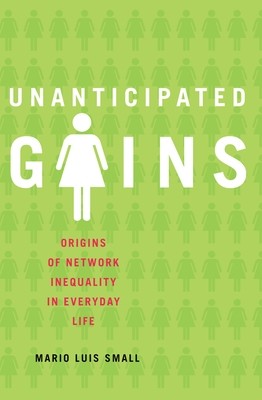
- We will send in 10–14 business days.
- Author: Mario Luis Small
- Publisher: Oxford University Press, USA
- ISBN-10: 0199764093
- ISBN-13: 9780199764099
- Format: 15.6 x 23.4 x 1.7 cm, softcover
- Language: English
- SAVE -10% with code: EXTRA
Reviews
Description
Social capital theorists have shown that some people do better than others in part because they enjoy larger, more supportive, or otherwise more useful networks. But why do some people have better networks than others? Unanticipated Gains argues that the practice and structure of the churches, colleges, firms, gyms, childcare centers, and schools in which people happen to participate routinely matter more than their deliberate "networking."
Exploring the experiences of New York City mothers whose children were enrolled in childcare centers, this book examines why a great deal of these mothers, after enrolling their children, dramatically expanded both the size and usefulness of their personal networks. Whether, how, and how much the mother's networks were altered--and how useful these networks were--depended on the apparently trivial, but remarkably consequential, practices and regulations of the centers. The structure of parent-teacher organizations, the frequency of fieldtrips, and the rules regarding drop-off and pick-up times all affected the mothers' networks. Relying on scores of in-depth interviews with mothers, quantitative data on both mothers and centers, and detailed case studies of other routine organizations, Small shows that how much people gain from their connections depends substantially on institutional conditions they often do not control, and through everyday processes they may not even be aware of. Emphasizing not the connections that people make, but the context in which they are made, Unanticipated Gains presents a major new perspective on social capital and on the mechanisms producing social inequality.EXTRA 10 % discount with code: EXTRA
The promotion ends in 17d.21:40:28
The discount code is valid when purchasing from 10 €. Discounts do not stack.
- Author: Mario Luis Small
- Publisher: Oxford University Press, USA
- ISBN-10: 0199764093
- ISBN-13: 9780199764099
- Format: 15.6 x 23.4 x 1.7 cm, softcover
- Language: English English
Social capital theorists have shown that some people do better than others in part because they enjoy larger, more supportive, or otherwise more useful networks. But why do some people have better networks than others? Unanticipated Gains argues that the practice and structure of the churches, colleges, firms, gyms, childcare centers, and schools in which people happen to participate routinely matter more than their deliberate "networking."
Exploring the experiences of New York City mothers whose children were enrolled in childcare centers, this book examines why a great deal of these mothers, after enrolling their children, dramatically expanded both the size and usefulness of their personal networks. Whether, how, and how much the mother's networks were altered--and how useful these networks were--depended on the apparently trivial, but remarkably consequential, practices and regulations of the centers. The structure of parent-teacher organizations, the frequency of fieldtrips, and the rules regarding drop-off and pick-up times all affected the mothers' networks. Relying on scores of in-depth interviews with mothers, quantitative data on both mothers and centers, and detailed case studies of other routine organizations, Small shows that how much people gain from their connections depends substantially on institutional conditions they often do not control, and through everyday processes they may not even be aware of. Emphasizing not the connections that people make, but the context in which they are made, Unanticipated Gains presents a major new perspective on social capital and on the mechanisms producing social inequality.

Reviews